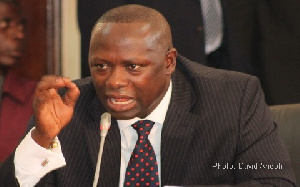 Ellembelle MP, Emmanuel Armah Kofi Buah
Ellembelle MP, Emmanuel Armah Kofi Buah
Member of Parliament for Ellembele, Emmanuel Armah Kofi Buah, has said the 2022 budget statement that was presented by the Finance Minister, Ken Ofori-Atta does not provide reliefs to businesses to enable them thrive.
According to him, the budget shows how the public sector debt is shooting up.
“We have moved from 120 billion debt to 380billion so our debt to GDP is now from 56 to 80 per cent, unsustainable levels of debts. This minister in this budget has not given us any structure that will give businesses reliefs,” the former Energy Minister told TV3 after the budget presentation.”
For his part, a former Deputy Minister of Finance, Kwaku Kwarteng said the government has demonstrated in the 2022 budget statement that it does not want to spend beyond its means while at the same time, it does not also want to overburden Ghanaians.
The Obuasi West lawmaker said the budget also scrutinises projects to ensure they have value for money.
“I am happy at the effort in this budget to scrutinise projects more to ensure that there is greater value for money and all the things that you would want to see in an economy that ought to be recovering.”
“I see a careful balance by the government, on the one hand, to ensure that we do not spend beyond your means whiles at the same time lessening the burden it will place on the people.”
During the budget presentation in Parliament on Wednesday, November 17, Finance Minister Ken Ofori-Atta said “data on the performance of the economy as at end-September 2021 indicate that the implementation of the 2021 budget is largely on track. Provisional GDP data released by the Ghana Statistical Service in September 2021 indicate that overall real GDP grew by 3.1 percent in quarter one and 3.9 percent in quarter two. Thus, the economy grew by an average of 3.5 percent in the first half of 2021 against the 0.8 percent in same period in 2020.”
“Headline inflation declined sharply from 10.4 percent in December 2020 to 7.5 percent in May 2021, broadly reflecting well-anchored inflation expectations, exchange rate stability and favourable food prices.”
“However, inflation picked up to 10.6 percent in September 2021 on account of shocks from domestic fuel price adjustments and increasing domestic food prices arising partly from climate-related factors, input supply bottlenecks, delayed harvests, and world food price increases. Inflation rose further to 11.0 percent in October, driven by non-food inflation.”
“Preliminary data for the first nine months of the year indicate that, Government’s fiscal operations resulted in a cash deficit of GH¢33.9 billion, equivalent to 7.7 percent of GDP, compared to the revised target of GH¢32.6 billion, equivalent to 7.4 percent of GDP.”
“The fiscal adjustments to save lives and preserve livelihoods during the pandemic, although well-intentioned, have elevated global debt levels. The situation in Ghana is no different.”
“The provisional nominal debt stock, including financial sector bailout costs and energy sector IPPs payments, stood at GH¢341.76 billion, equivalent to 77.5 percent of GDP as at end-September 2021, up slightly from GH¢291.63 billion, equivalent to 76.1 percent in December 2020.”
“Notwithstanding the elevated fiscal deficit and public debt levels recorded due to COVID-19, our macro-fiscal indicators are much better than what we inherited.”
TWI NEWS